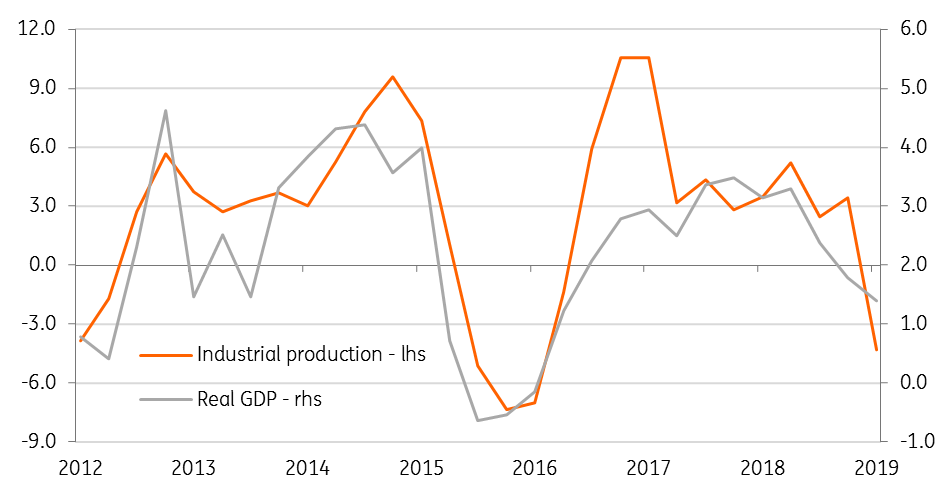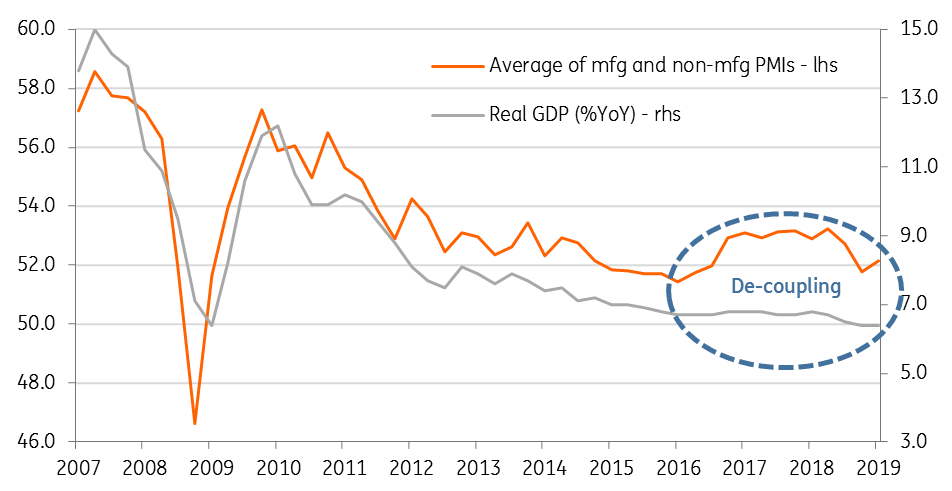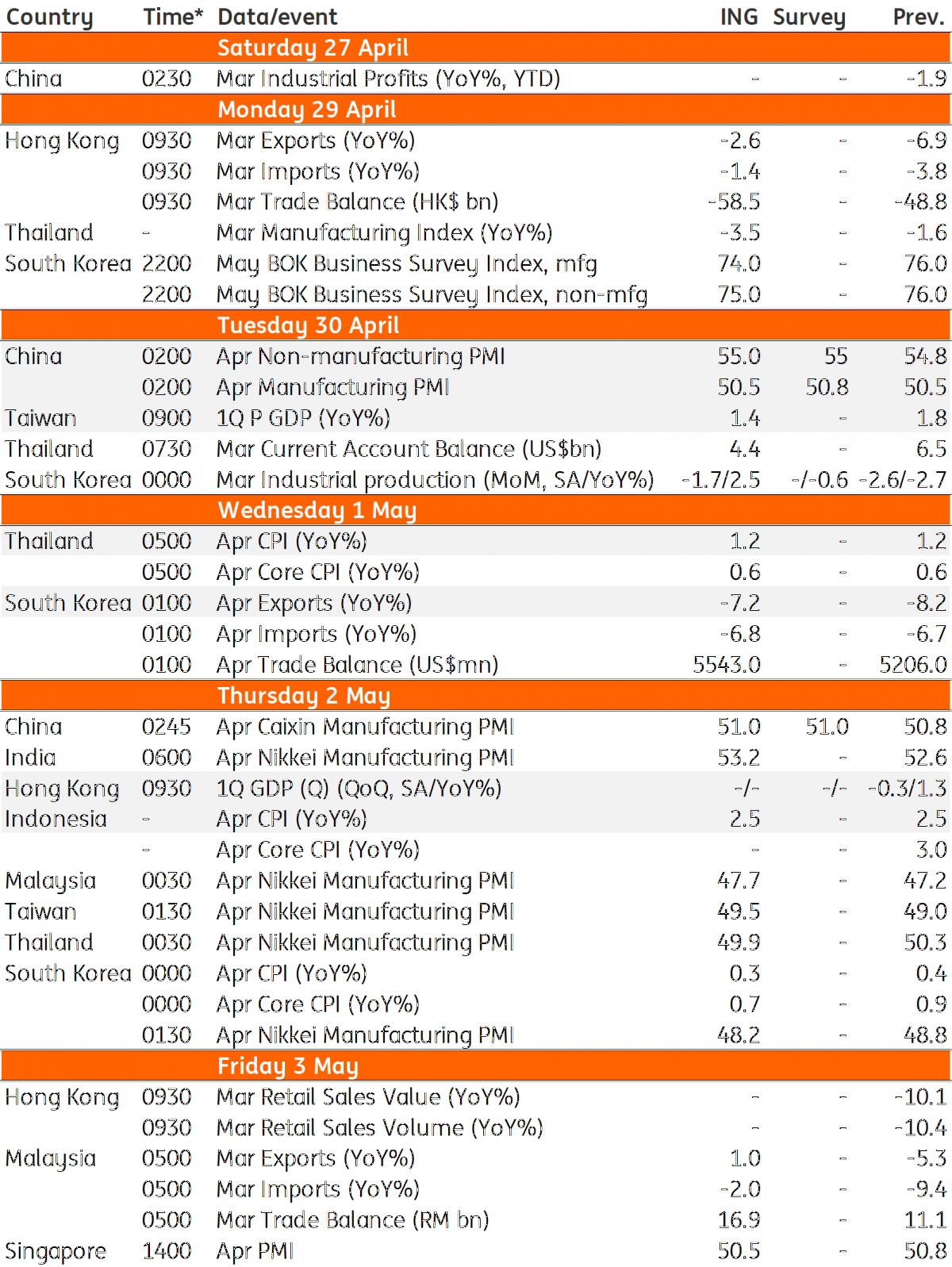Asia week ahead: Is a technical recession lurking?
Some Asian economies are already showing signs that a 'technical recession' may be around the corner, but low inflation gives central banks some room to avert one. But aside from that, April economic data should provide a glimpse of where GDP growth and inflation are headed in the second quarter
Is a 'technical recession' lurking?
1Q19 GDP reporting season is catching up with more Asian countries reporting data next week.
Aside from China, the slowdown in Asian economies gained traction in the first quarter of the year. China’s GDP growth was steady, thanks to the fiscal stimulus, but Korea and Singapore posted sharp growth slowdowns in 1Q19, and the countries reporting next week – Hong Kong and Taiwan – are likely to join this camp too.
The critical question is whether a recession is around the corner. Korea was the first in Asia to report quarterly GDP contraction in 1Q19. Taiwan could follow suit, judging by a steep fall in its manufacturing in the last quarter. As things stand now, we can’t rule out another quarter of GDP contraction in 2Q, and after today's GDP numbers from Korea, we think a 'technical recession' is quite plausible.
Taiwan's manufacturing is dragging GDP lower (% YoY)

April data should give a glimpse of 2Q growth
April trade data and purchasing managers' index should provide a glimpse of where GDP growth is headed in 2Q. Preliminary manufacturing PMIs from developed countries bode well for those due from Asia next week. The export order components of PMI will be judged for the trade story, which doesn’t seem to be getting any better though.
Chinese data will be under scrutiny to see if the economy’s better-than-expected performance in the first quarter was a blip and if the slowdown has been delayed. This may be hard to judge from soft data like PMIs, given its de-coupling from real GDP growth in recent years. But it’s still a key sentiment driver for markets. A slight improvement as implied by consensus forecasts for both manufacturing and non-manufacturing PMI will be good enough to put a positive spin on China’s growth story.
Korea is the first economy in the region, and probably the world, to release trade figures for April, and should prove to be a good guide to trade from the rest of the region. We see no respite from the falling trend in Korean exports which have been reeling under the global tech slump.
China: De-coupling of PMI and GDP growth

Low inflation allows for more policy support
Korea also reports consumer price data for April along with Indonesia and Thailand.
Aside from the upward pressure on global oil prices, there is nothing to worry about inflation in Asia. And an oil-driven rise in inflation isn’t something we expect to see in an environment of slowing growth. But the current low level of inflation across the region does give central banks the scope if needed to ease policies to support growth.
Asia Economic Calendar

Tags
Asia week aheadDownload
Download article29 April 2019
What’s happening in Australia and around the world? This bundle contains {bundle_entries}{/bundle_entries} articles"THINK Outside" is a collection of specially commissioned content from third-party sources, such as economic think-tanks and academic institutions, that ING deems reliable and from non-research departments within ING. ING Bank N.V. ("ING") uses these sources to expand the range of opinions you can find on the THINK website. Some of these sources are not the property of or managed by ING, and therefore ING cannot always guarantee the correctness, completeness, actuality and quality of such sources, nor the availability at any given time of the data and information provided, and ING cannot accept any liability in this respect, insofar as this is permissible pursuant to the applicable laws and regulations.
This publication does not necessarily reflect the ING house view. This publication has been prepared solely for information purposes without regard to any particular user's investment objectives, financial situation, or means. The information in the publication is not an investment recommendation and it is not investment, legal or tax advice or an offer or solicitation to purchase or sell any financial instrument. Reasonable care has been taken to ensure that this publication is not untrue or misleading when published, but ING does not represent that it is accurate or complete. ING does not accept any liability for any direct, indirect or consequential loss arising from any use of this publication. Unless otherwise stated, any views, forecasts, or estimates are solely those of the author(s), as of the date of the publication and are subject to change without notice.
The distribution of this publication may be restricted by law or regulation in different jurisdictions and persons into whose possession this publication comes should inform themselves about, and observe, such restrictions.
Copyright and database rights protection exists in this report and it may not be reproduced, distributed or published by any person for any purpose without the prior express consent of ING. All rights are reserved.
ING Bank N.V. is authorised by the Dutch Central Bank and supervised by the European Central Bank (ECB), the Dutch Central Bank (DNB) and the Dutch Authority for the Financial Markets (AFM). ING Bank N.V. is incorporated in the Netherlands (Trade Register no. 33031431 Amsterdam).
